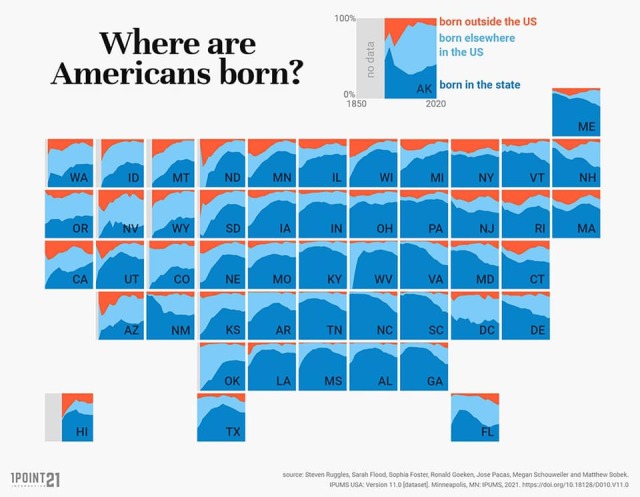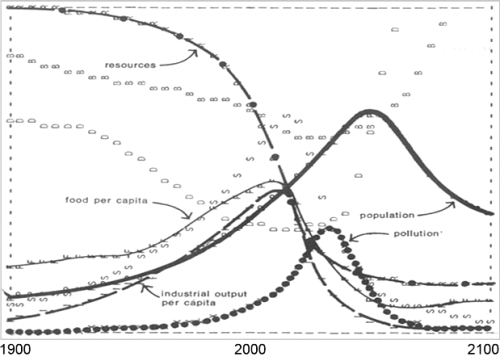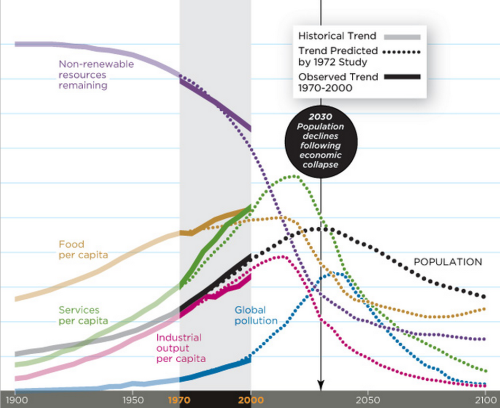#demography
40 years ago in 1972, the Club of Rome released a highly controversial environmental study, The Limits to Growth (AB). It estimated that if we continued to consume more than nature was capable of providing, global economic collapse and precipitous population decline could occur by 2030.
Research by Australian physicist Graham Turner supports the conclusions reached 40 years earlier by the MIT researchers that performed the original study. Turner compared real-world data from 1970 to 2000 to the first model and found that the predictions nearly matched the facts. “There is a very clear warning bell being rung here,” he says. “We are not on a sustainable trajectory.” (viaSmithsonian)
Post link

Where are Americans born?
Source: Steven Ruggles, Sarah Flood, Sophia Foster, Ronald Goeken, Jose Pacas, Megan Schouweiler, and Matthew Sobek. IPUMS USA: Version 11.0 [dataset]. Minneapolis, MN: IPUMS. 2021/
United States: 2020 Census Results Released
The 2020 Census data, released on Thursday, reveals the most recent U.S. demographic data. This map depicts the percent change in U.S. population by county compared to the 2010 Census. The Census Bureau’s goal is to count every American once a decade, and undercounts and overcounts from this year’s census survey won’t be released until next year.These data will be used to draw new congressional districts as well as dictate how $1.5 trillion dollars of annual public spending is distributed. Regional trends showed that Americans continued to migrate to the South and West at the expense of the Midwest and Northeast. In addition, the U.S. has become more urban and more diverse, as the non-Hispanic white population decreased for the first time on record. Lower birth rates for white women compared to Asian and Hispanic women drove this ethnic change.
Further Reading:New York Times,The Hill,AP via Yahoo! News,Bloomberg Quicktake, American Geographical Society. Graphic Source: AP News.
Post link
How to Visualize One Part Per Million
It can be helpful to visualize this number when talking about very small probabilities like dying in a plane crash and doing so can help put more pressing health conditions into perspective, such as the fact that we are approaching a time where 50% of people will develop diabetes in their lifetimes.



Get to know Sheena Kristine Cases, data analyst and policy researcher
1) What do you do?
I crunch data, integrate knowledge, write stories using data and various information, package them, and then share them. I am a research generalist who has found some meaning in doing data management and analysis, MEAL (monitoring, evaluation, accountability, and learning) work, and knowledge management. I have been working in the development sector for six years now with a few more years spent on policy and academic research.
2) Where do you work?
I currently work at the U.N. Development Programme (UNDP) as a Data Analyst for Pintig Lab, a multi-stakeholder network of physicians, economists, and data scientists tasked with providing the government with data-driven systems and policy insights to help inform COVID-19 response and recovery strategy.
I also previously worked for Oxfam Pilipinas as a Knowledge Management Senior Officer and for Save the Children as a Monitoring, Evaluation, Accountability, and Learning Officer.
As my volunteer work, I write for Subselfie.com, an online magazine for the young generation of Filipinos. I write about faith, mental health, and some personal reflections about life in general. I also serve at Victory Church where I tried teaching kids (our future leaders) Bible principles for a few years and also am trying my best to lead single professionals.
3) Tell us about the photos!
[Top left and right:] My grad photo and artworks. I also like to draw and paint. Back then when I had more time, I am able to finish more detailed artworks. Now, I resort to doing creative doodles. Doodles are also fun to make.
[Bottom:] Research Bootcamp at Bangkok, Thailand sponsored by Oxfam in Asia! It was an awesome week learning the Oxfam way of doing research. I have learned important pointers for writing for the public for influencing from this memorable trip, aside from the fact that I have been with beautiful and passionate people. Buddies during this trip were also fun to be with.
4) Tell us about your academic career path so far.
I studied in the U.P. Integrated School from Kinder to Grade 10. I initially took up B.S. Civil Engineering for a year before shifting to B.S. Economics in U.P. Diliman where I found more flexibility and breadth in learning (we had an option to take many electives). I graduated in 2011 with honors. I then worked for a few months doing policy work and then spent eight months working for a start-up company doing research on biofuels. I then decided to take up M.A. Demography in 2012 in the U.P. Population Institute. It was a long haul before I graduated because I decided to work to help my siblings and aging parents. Finally, in 2019 I finished my program with a Master’s thesis titled, “The Relationship Between Religiosity and Fertility: A Comparison of Five Major Religions”. I was one of the online graduates in July 2020.
I took up consultancy work when I was finishing my Master’s thesis. One memorable consultancy work was when I did data management for the K to 12 Program Transition Task Force of the Commission on Higher Education where we estimated the budget needed for the K to 12 transition. Another was when I did archival research for a PhD student in Harvard University where I got to examine letters from the First Republic of the Philippines.
The years that followed were all development research, monitoring, and evaluation on projects falling under the themes ranging from youth employment, women empowerment, and resilience.
Since the COVID-19 crisis hit the world, I have been pondering about doing a PhD. I think expecting too much from myself right now is not good for mental health. We have to go back to basics. So I just pray about it. Hopefully soon, I’ll be able to fulfill that dream.
5) Anything else you’d like to share
I thank God for His grace and mercy. To God be all the glory. Take care and keep safe.
Also your guy here is going to EPC2022 this end of the month so if any phdblr in sociology/demography is there hit me up with a dm/ask and we can chat!
Incidentally, it’s my first conference ever so if anyone has tips and tricks about making the most of conferences, let me know



